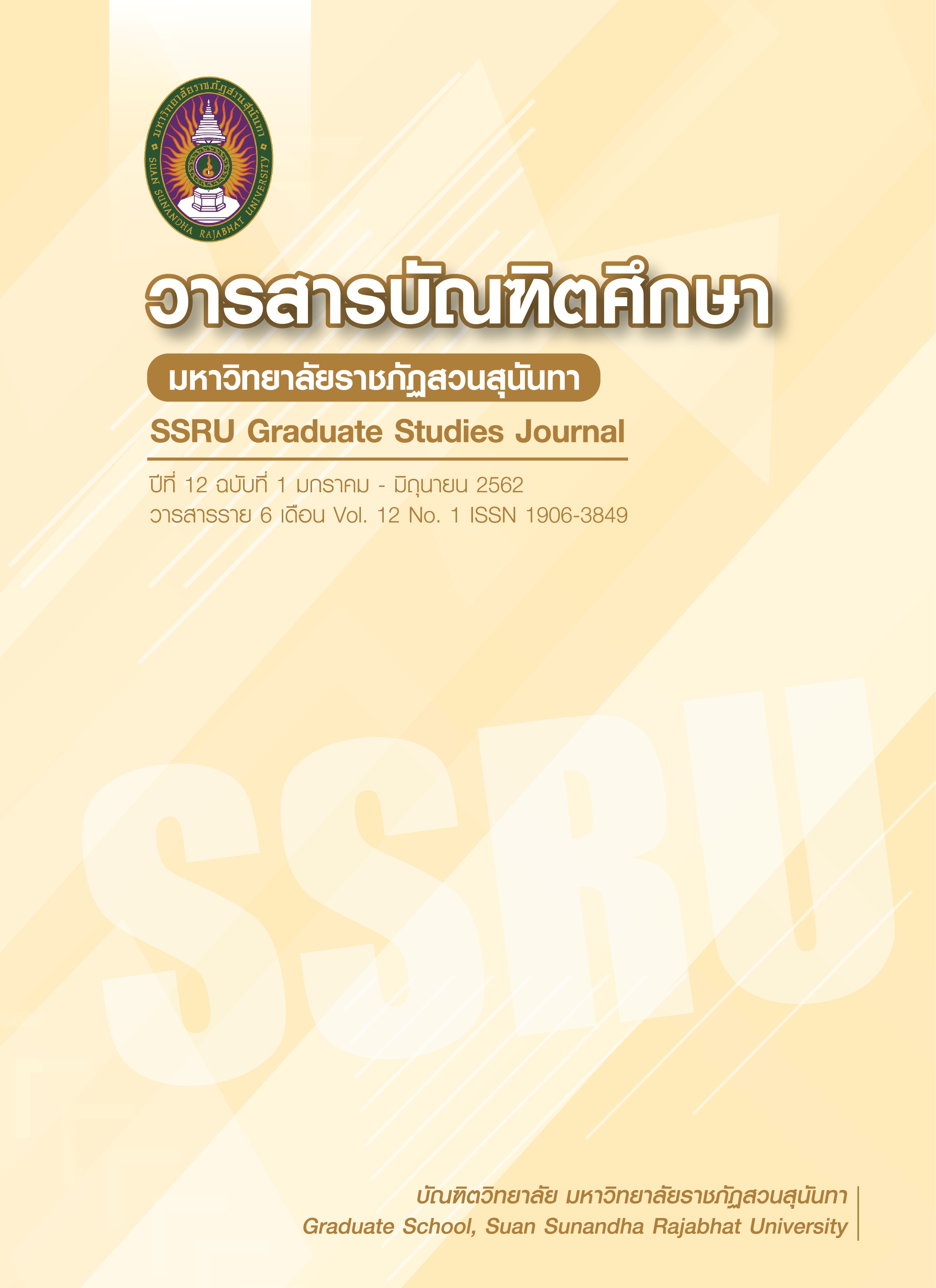ทัศนคติของผู้โดยสารชาวไทยต่อพนักงานต้อนรับบนเครื่องบิน
Main Article Content
บทคัดย่อ
การศึกษาวิจัยนี้มีวัตถุประสงค์เพื่อศึกษาถึงทัศนคติของผู้โดยสารชาวไทยที่มีต่อพนักงานต้อนรับบนเครื่องบินทั้งในเชิงบวกและเชิงลบ งานวิจัยนี้เป็นงานวิจัยเชิงคุณภาพ ผู้ให้ข้อมูล คือ ผู้โดยสารชาวไทยจำนวน 12 คน ซึ่งถูกคัดเลือกโดยใช้วิธีคัดเลือกแบบเฉพาะเจาะจงร่วมกับการคัดเลือกแบบก้อนหิมะ เก็บข้อมูลโดยการสัมภาษณ์ส่วนบุคคลแบบกึ่งโครงสร้าง ร่วมกับการสังเกตแบบผู้วิจัยมีส่วนร่วมในกิจกรรม วิเคราะห์ข้อมูลโดยการวิเคราะห์แบบแก่นสาระ (Braun & Clarke, 2006) ผลการวิจัยพบว่า ผู้โดยสารชาวไทยมีทัศนคติต่อพนักงานต้อนรับบนเครื่องบินในเชิงบวก ตามกรอบแนวคิดของ Ajzen and Fishbein (1980) ประกอบด้วย 1) มิติด้านการรับรู้ ความเชื่อ 2) มิติด้านอารมณ์ ความรู้สึก และ 3) มิติด้านพฤติกรรม โดยมิติด้านการรับรู้ ความเชื่อ ประกอบด้วยทัศนคติ 7 ประการได้แก่ เป็นผู้มีบุคลิกภาพที่โดดเด่น เป็นผู้ที่มีความสำคัญในธุรกิจการบิน เป็นผู้มีจิตใจรักงานบริการ เป็นผู้มีทักษะทางภาษา เป็นผู้มีความสามารถเผชิญและแก้ไขสถานการณ์ที่ยากลำบากได้ดี เป็นอาชีพที่มีโอกาสมากกว่าอาชีพอื่น และเป็นอาชีพที่ใช้ทักษะ ความรู้น้อย มิติด้านอารมณ์ ความรู้สึก พบว่า ผู้โดยสารมีความรู้สึกที่หลากหลาย ทั้งความรู้สึกชอบ ชื่นชม ความรู้สึกเฉย ๆ และความรู้สึกสงสาร เห็นใจ และท้ายที่สุดในมิติด้านพฤติกรรม ผู้ให้ข้อมูลระบุถึงความรู้สึกประทับใจและกลับมาใช้บริการอีกในอนาคต และกล่าวคำขอบคุณพร้อมรอยยิ้ม
Article Details
เอกสารอ้างอิง
สายการบินราคาประหยัดและวัฒนธรรมอาชีพแอร์โฮสเตส. วิทยานิพนธ์มานุษยวิทยา
มหาบัณฑิต มานุษยวิทยา, จุฬาลงกรณ์มหาวิทยาลัย.
เกษม พิพัฒน์เสรีธรรม. (2555). หมัดเด็ดกลยุทธครบเครื่องการสื่อสารการตลาด (พิมพ์ครั้งที่ 3).
กรุงเทพฯ: มติชน.
จิตตินันท์ นันทไพบูลย์. (2551). จิตวิทยาการบริการ. กรุงเทพฯ: ซีเอ็ด ยูเคชั่น.
ชินโชติ เทียมเมธี.(2554). ภาพลักษณ์พนักงานต้อนรับบนเครื่องบิน และเจตคติของผู้โดยสารต่อ
พนักงานต้อนรับบนเครื่องบินที่เป็นบุคคลรักเพศเดียวกันที่พยากรณ์ความประทับใจในการบริการของ สายการบิน . วิทยานิพนธ์ศิลปศาสตรมหาบัณฑิต วิชาจิตวิทยาสาขาอุตสาหกรรมและองค์การ,มหาวิทยาลัยเทคโนโลยีพระจอมเกล้าพระนครเหนือ.
ธนพร เรืองพณิชยกุล. (2555). ความคิดเห็นของผู้โดยสารคนไทยที่มีต่อคุณภาพการบริการของ
บริษัท การบินไทย จำกัด (มหาชน). วิทยานิพนธ์บริหารธุรกิจมหาบัณฑิต วิทยาการจัดการ,
,มหาวิทยาลัยสุโขทัยธรรมมาธิราช.
รวีวรรณ โปรยรุ่งโรจน์. (2551). จิตวิทยาการบริการ. กรุงเทพฯ: โอเดียนสโตร์.
สยามรัฐออนไลน์. (2561). วีซ่าเผยผลสำรวจคนไทยใช้เงินเที่ยวบ่อยและมากกว่านักท่องเที่ยวทั่วโลก.
สืบค้นเมื่อ เมษายน 2, 2562, จาก http://siamrath.co.th/n/3885.
ศักดิ์ไทย สุรกิจบวร. (2545). การประชาสัมพันธ์ (พิมพ์ครั้งที่ 8). กรุงเทพฯ: สำนักพิมพ์จุฬาลงกรณ์
มหาวิทยาลัย.
สุชา จันทน์เอม. (2544). จิตวิทยาทั่วไป (พิมพ์ครั้งที่ 13). กรุงเทพฯ: ไทยวัฒนาพานิช.
เสรี วงษ์มณฑา. (2542). การประชาสัมพันธ์: ทฤษฎีและปฏิบัติ. กรุงเทพฯ: ธีระฟิล์มและไซเท็กซ์.
กรุงเทพธุรกิจ. (2557). อนาคตและความท้าทายของธุรกิจการบินในน่านฟ้าอาเซียน.
สืบค้นเมื่อ พฤษภาคม 31, 2562, จาก https://www.bangkokbiznews.com/blog/detail/
553708.
Ajzen, I. (2005). Attitudes,personality and beheavior (2nd ed.). Berkshire,England: Open
University Press.
Ajzen, I. & Fishbein, M. (1980). Undrestanding attitudes and predicting social behavior.
Englewood cliffs, NJ: Prentice-Hall.
Braun, V. & Clarke, V. (2006). Using thematic analysis in psychology: Qualitative research in
psychology. London: Routledge.
FitzMaurice, K. E. (2011). The attitude is all you need! (2nd ed.). N.p.: FitzMaurice.
Gilbert, D. T., Fiske, S. T. & Linzey, G. (1997). The handbook of social psychology (4th ed.)
(Vol 1). New York: McGraw-Hill.


